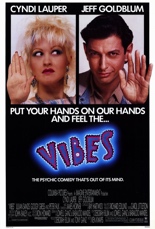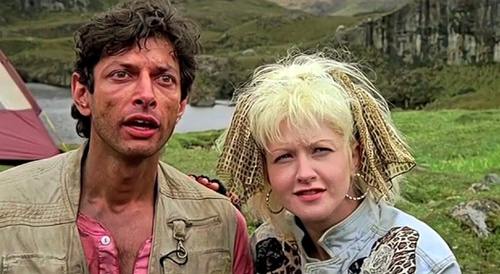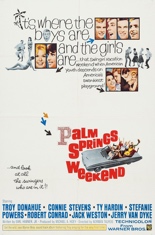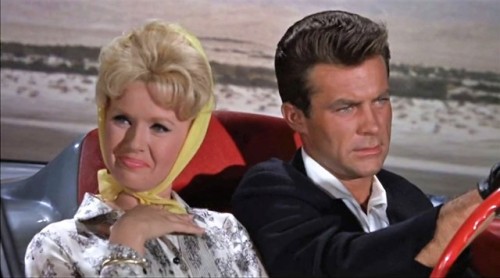
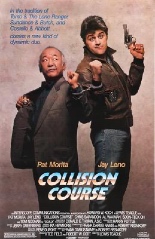 Rather famously, producer Dino De Laurentiis lost hundreds of millions of dollars in the late ’80s dropping bomb after bomb through his then-new De Laurentiis Entertainment Group. Among DEG’s epic critical and commercial failures? The too-late sequel King Kong Lives, the James Clavell adaptation Tai-Pan and the garbage-bag gimmickry known as Million Dollar Mystery.
Rather famously, producer Dino De Laurentiis lost hundreds of millions of dollars in the late ’80s dropping bomb after bomb through his then-new De Laurentiis Entertainment Group. Among DEG’s epic critical and commercial failures? The too-late sequel King Kong Lives, the James Clavell adaptation Tai-Pan and the garbage-bag gimmickry known as Million Dollar Mystery.
As bad as those movies are, what does it say about the ones DEG deemed unreleasable? In particular, I speak of the Pat Morita/Jay Leno vehicle Collision Course, which drove direct to video in the U.S. in 1992, after sitting on Dino’s shelf for what I now understand to be not nearly long enough. My guess is De Laurentiis thought he could make Leno, then a white-hot stand-up comic, into the next Tom Hanks. In one fell swoop, Leno went from killing it on Late Night with David Letterman to killing his chances at headlining further films.
As Detroit police detective Tony Costas, the skunk-haired Leno is objectively terrible in this buddy-cop disaster opposite Pat Morita as Fujitsuka Natsuo, Costas’ Tokyo counterpart. In Japan, a rogue engineer for an automotive giant has stolen a turbocharger prototype and made his way to the Motor City to sell it to an American rival; Natsuo follows. Inevitably, cultures clash — until they team up.
Leno is laughable at playing a tough guy (!), and not at all laugh-worthy with, one assumes, improvising his dialogue. For example, surprising Natsuo by emerging from behind a door with gun drawn, Costas offers the nonsensical greeting “Hey, hey, we’re the Monkees.” He may as well have just said, “Crunch all you want! We’ll make more,” because at least we have evidence Leno was comfortable with that.
In another scene, Natsuo is interrogated by Costas’ colleague (Al Waxman, Iron Eagle IV), who says, “I speak some Jap: Toyota, Mitsubishi, Kawasaki, teriyaki,” which is clever and hilarious — or so say second graders on the playground at lunch. The line is not just indicative of how the script (by producer Frank Darius Namei and The First Power’s Robert Resnikoff) treats Morita’s race, but also the degree of humor at which said script simmers: the lowest possible setting.
Pity poor Morita, reduced from an Academy Award nomination for Best Supporting Actor to running around a hotel lobby with a plastic garment bag over his head. I mean, at least the guy found work between Karate Kid sequels, but ouch. Another actor who deserved better: Tom Noonan, here as a villain after embodying evil in Michael Mann’s Manhunter, one of the few DEG projects enjoying a life today. Did Dino weasel Noonan into some bad-guy twofer deal?
Appropriately opening with the sound of a car wreck, Collision Course marks an odd entry in the filmography of Lewis Teague, the Roger Corman protégé known for horror films (Alligator, Cujo and Cat’s Eye), not comedy. This dud bears no stamp of his previous proficiency. —Rod Lott

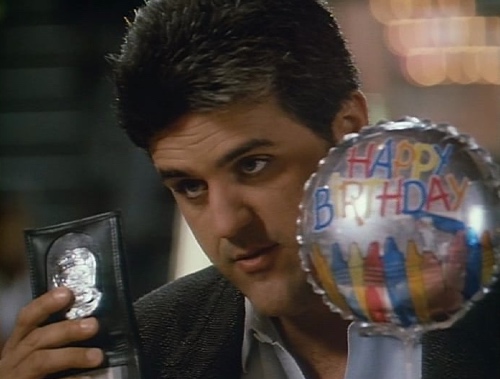
 Is Hollywood out of touch? In 1993, Fay Sommerfield investigated as much for the newsmagazine show she anchored, That Time of the Month. So goes Sex, Shock & Censorship in the 90’s, a made-for-Showtime parody of then-topical targets — mostly among the entertainment industry itself — and presented under the guise of a major network’s then-ubiquitous shows like PrimeTime Live and 20/20. Sommerfield is played by Shelley Long (
Is Hollywood out of touch? In 1993, Fay Sommerfield investigated as much for the newsmagazine show she anchored, That Time of the Month. So goes Sex, Shock & Censorship in the 90’s, a made-for-Showtime parody of then-topical targets — mostly among the entertainment industry itself — and presented under the guise of a major network’s then-ubiquitous shows like PrimeTime Live and 20/20. Sommerfield is played by Shelley Long (
 Otherwise, The $49.95 Club, a mix of televangelism and QVC, holds potential, but never achieves it. Ratman & Frisky channels
Otherwise, The $49.95 Club, a mix of televangelism and QVC, holds potential, but never achieves it. Ratman & Frisky channels 